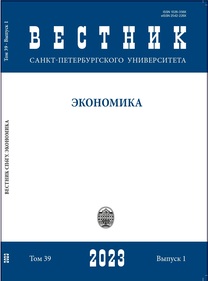Reflection of the concept of energy transfer in the development strategies of industries and regions of Russia
DOI:
https://doi.org/10.21638/spbu05.2023.104Abstract
The article discusses the reasons and factors that make it necessary to transform the structure
of the energy sector and approaches developed to implement the state policy of energy transition
in modern conditions without creating an additional burden on the environment. The relevance of the topic is confirmed by the global trend of transition to the use of alternative energy sources, the development of low-carbon technologies and considerations of the exhaustibility of sources of fossil raw materials with the objective need to find ways to develop alternative energy, as well as increased external sanctions pressure. A brief review of approaches to the development of energy strategies in several foreign countries is presented including relevant documents of the USA, European Union, Germany and France. The conclusion is made
about the global nature of the energy transition processes and the seriousness of the challenges facing Russia in the context of current trends in the transformation of the world energy industry and attempts to use the energy transition factor to increase external pressure. The current Russian strategic planning documents at the federal, sectoral and regional levels are analyzed in terms of reflecting the state policy measures for the development of renewable energy and the decarbonization of the economy. Among the documents of the federal level, the strategies of national security, economic security, the strategy of socio-economic development with low greenhouse gas emissions (low-carbon strategy) and the strategy for the development of the Arctic zone are considered. Industry strategies for the development of metallurgy, energy, transport, construction, science and technology are analyzed, as well as regional strategies for some subjects of the Russian Federation. The conclusion is made that it is necessary to develop a systemic long-term state policy in the field of energy transition and its introduction in the strategies of industries and regions of Russia
Keywords:
energy transition, renewable energy sources, state energy policy, energy efficiency, decarbonization of the economy, sanctions pressure
Downloads
References
Андреева, Е. Л., Ратнер, А. В. и Соболев, А. О. (2021) ‘Влияние развития возобновляемых источников энергии в Германии на российский экспорт энергоносителей’, Современная Европа, 4, с. 71–82.
Башмаков, И. А. (2022) ‘Углеродное регулирование ЕС и российский сырьевой экспорт’, Вопросы экономики, 1, c. 90–109.
Вареничев, А. А., Громова, М. П. и Потапов, И. И. (2021) ‘Роль сжиженного природного газа в освоении Северного морского пути. Обзор’, Экономика природопользования, 3, с. 22–28.
Гаранина, О. Л. (2021) ‘Повестка энергетического перехода: вызовы для России в контексте пандемии’, Российский внешнеэкономический вестник, 4, с. 40–52.
Ершов, Д. Н. (2022) ‘Проблемы и перспективы развития «зеленого» роста’, Вестник Волгоградского государственного университета. Экономика, 24 (1), с. 19–33.
Кабир, Л. С. и Сигова, М. В. (ред.) (2020) «Зеленые» финансы: процесс развития и перспективы трансформации. М., СПб.: Изд-во АНО ВО «МБИ им. А. Собчака».
Мастепанов, А. М. (2021) ‘Основные движущие силы энергетического перехода и проблемы его достижения’, Проблемы постсоветского пространства, 8 (2), с. 256–276.
Мастепанов А. М. (2022) ‘Россия на пути к углеродной нейтральности’, Энергетическая политика,1 (167), с. 94‑103.
Мень, М. А. и Каульбарс, А. А. (2020) ‘Отчет о результатах экспертно-аналитического мероприятия «Анализ воспроизводства минерально-сырьевой базы Российской Федерации в 2015–2019 годах»’, Счетная палата Российской Федерации. URL: https://ach.gov.ru/upload/iblock/b99/b998773313b87e724ed09f287754d180.pdf (дата обращения: 26.04.2022).
Пахомова, Н. В., Рихтер, К. К. и Ветрова, М. А. (2022) ‘Глобальные климатические вызовы, структурные сдвиги в экономике и разработка бизнесом проактивных стратегий достижения углеродной нейтральности’, Вестник Санкт-Петербургского университета. Экономика, 38 (3),с. 331–364.
Пискулова, Н. А. (2022) ‘Энергопереход 4.0: влияние на экономические отношения России и ЕС’, Российский экономический вестник, 1, с. 27–38.
Попадько, Н. В., Рожнятовский, Г. И. и Дауди, Д. И. (2021) ‘Водородная энергетика и мировой энергопереход’, Инновации и инвестиции, 4, с. 59–64.
Попель, О. С. (2008) ‘Возобновляемые источники энергии: роль и место в современной и перспективной энергетике’, Российский химический журнал, 52 (6), с. 95–106.
Порфирьев, Б. Н., Широв, А. А. и Колпаков, А. Ю. (2021) ‘Комплексный подход к стратегии низкоуглеродного социально-экономического развития России’, Георесурсы, 23 (3), c. 3–7.
Соколов, М. М. (2021) ‘Стратегии России по введению трансграничного углеродного регулирования в ЕС’, Геоэкономика энергетики, 3 (15), с. 84–97.
Телегина, Е. А., Студенкина, Л. А. и Чапайкин, Д. А. (2021) ‘Новые вызовы энергорынка — мир и Россия, возможности роста’, Энергетическая политика, 8 (162), с. 18–29.
Appunn, K. and Wettengel, J. (2021) ‘Germany’s Climate Action Law’, Clean Energy Wire, July 12. URL: https://www.cleanenergywire.org/factsheets/germanys-climate-action-law-begins-take-shape (дата обращения: 26.04.2022).
Appunn, K. and Wettengel, J. (2022) ‘Germany boosts renewables with «biggest energy policy reform in decades»’, Clean Energy Wire, April 7. URL: https://www.cleanenergywire.org/news/germany-boosts-renewables-biggest-energy-policy-reform-decades (дата обращения: 26.04.2022).
Dickel, R. (2014) ‘The New German Energy Policy: What Role for Gas in a De-carbonization Policy?’, The Oxford Institute for Energy Studies. URL: https://www.oxfordenergy.org/wpcms/wp-content/uploads/2014/03/NG-85.pdf (дата обращения: 26.04.2022).
Edenhofer, O., Pichs-Madruga, R., Sokona, Y., Seyboth, K., Matshoss, P., Kadner, S., Zwickel, T., Eickemeier, P., Hansen, G., Schlömer, S. and von Stechow, C. (2011) Special Report on Renewable Energy Sources and Climate Change Mitigation (SRREN), Intergovernmental Panel on Climate Change (IPCC). CambridgeUniversity Press. URL: https://www.ipcc.ch/site/assets/uploads/2018/03/SRREN_Full_Report-1.pdf (дата обращения: 17.10.2022).
Franke, A. (2022) ‘Germany to double down on wind, solar amid wider energy policy review’, S&P Global, March 4. URL: https://www.spglobal.com/commodityinsights/en/market-insights/latest-news/electric-power/030422-germany-to-double-down-on-wind solar-amid-wider-energy-policy-review(дата обращения: 26.04.2022).
Masterson, V. (2021) ‘US fossil fuel consumption is at its lowest in 30 years. Here’s why’, World Economic Forum, July 19. URL: https://www.weforum.org/agenda/2021/07/us-fossil-fuel-consumption-eia/ (дата обращения: 26.04.2022).
Shields, L. (2020) ‘The Growing Role of Energy Storage in Clean Energy Policy’, National Conference of State Legislatures, November 4. URL: https://www.ncsl.org/research/energy/the-growing-role-of-energystorage-in-clean-energy-policy.aspx (дата обращения: 26.04.2022).
Smil, V. (2010) Energy Transitions: History, Requirements, Prospects. St Barbara: Praeger Publ.
Sönnichsen, N. (2022) ‘Fossil fuel energy consumption in the United States from 1985 to 2021’, Statista, March 31. URL: https://www.statista.com/statistics/183617/us-energy-consumption-from-fossil-fuels-since-1985/ (дата обращения: 26.04.2022).
Downloads
Published
How to Cite
Issue
Section
License
Articles of the St Petersburg University Journal of Economic Studies are open access distributed under the terms of the License Agreement with Saint Petersburg State University, which permits to the authors unrestricted distribution and self-archiving free of charge.






